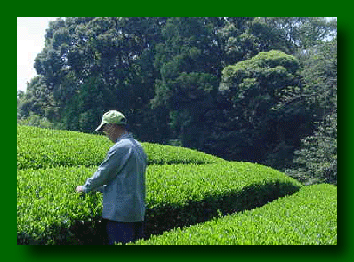 |
Wishing to Communicate through Subtle Properties of Green Tea
|
|
Allow me to explain a bit more in detail why we've decided to introduce this particular green-tea product produced organically by Mr. Suzuki in our hometown. The initial reason was simply to offer a good-tasting, premium-quality, easy-to-make, wholesome green tea product to people living outside Japan.
I set out to look for "organic"green tea powder unlike the sample we were offered, as I knew that health-conscious Californians would not settle for anything less. I wouldn't either. Use of agricultural chemicals is detrimental not only to our health but also to our precious soil and water that provide the energy and sustenance for all living organisms on earth. Unfortunately, however, most tea farmers cannot get out of such poisonous practice for a number of reasons. Conventionally, green tea cultivation requires lots of pesticides to protect fragile tea leaves from infestation, as well as loads of nitrogen-heavy synthetic fertilizers that are believed to be essential for increasing certain amino acids that produce "umami" or the distinct savory taste of high-quality green tea, even though nitrogen-rich chemical fertilizers would deplete the soil in the long run. I was later told that if a farmer wanted to convert his farmland into an organic one, he should expect no income at least for the first five years. It would take three years for the tea plants to become strong enough not to be completely chewed up by pests, plus a couple of years or longer for the soil to build up naturally occurring nutrients. But even after that, there is no guarantee. The "nitrogen myth" is still prevalent in the green tea industry, and most traders would not appreciate (or buy) organic green tea because of less umami. "Ok, if that's the case, I will cultivate a new market for the organic farmers of my hometown to support their solitary efforts. I mean, it is only logical for a futuristic company like us to initiate such a project," I thought to myself determinedly. So my search for organic green tea began, and before long I was able to locate a few sources. But for one reason or another, things just didn't click until I found Mr. Suzuki's green tea at an organic food store in my neighborhood. I brought home a packet of his powdered green tea, took a sip, and felt it was what I had been looking for. |
||
Back to Home
 In the summer of 1998, my family and I visited Kakegawa Castle for sightseeing and afterwards were offered a free cup of powdered green tea dissolved in ice water at a nearby souvenir shop. We were all pleasantly surprised by its refreshing taste and flavor. "This is perfect for overseas green-tea lovers," I thought, remembering how difficult it had been to find full-flavored green tea in the San Francisco Bay Area, where I had lived for ten years between 1982 and 1993.
In the summer of 1998, my family and I visited Kakegawa Castle for sightseeing and afterwards were offered a free cup of powdered green tea dissolved in ice water at a nearby souvenir shop. We were all pleasantly surprised by its refreshing taste and flavor. "This is perfect for overseas green-tea lovers," I thought, remembering how difficult it had been to find full-flavored green tea in the San Francisco Bay Area, where I had lived for ten years between 1982 and 1993.